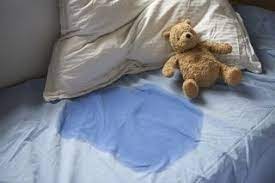7 mom-approved and natural tips to stop bedwetting

Bedwetting can be frustrating, both for parents and little ones, but it’s actually a lot more common than most people think. If your child still has the occasional nighttime accident, you’re definitely not alone. Many kids take longer to stay dry through the night, and in most cases, it’s simply a part of growing up, not something to worry about.
You don’t need harsh methods or medications to help your child overcome bedwetting. With patience, love, and a few gentle, natural strategies, you can support your child’s confidence and help them wake up dry and proud.
In this post, we’ll share 7 mom-approved, natural tips to stop bedwetting, simple, science-backed routines that really work for families. From bedtime habits to emotional support, you’ll learn how to make nighttime dry and stress-free for everyone.
Why Bedwetting Happens (7 mom-approved and natural tips to stop bedwetting)
Before you can help your child stay dry through the night, it’s important to understand why bedwetting happens, and why it’s completely normal.
Most kids who wet the bed aren’t doing it on purpose. In fact, bedwetting (also called nighttime enuresis) often happens because a child’s body is still developing the ability to stay dry while sleeping. Here are a few common reasons:
- Bladder Maturity: Some children’s bladders simply need more time to grow and hold urine through the night.
- Deep Sleep: If your child sleeps very deeply, they might not wake up when their bladder feels full.
- Genetics: Bedwetting can run in families, if one or both parents experienced it as children, their kids might too.
- Stress or Change: Starting school, moving to a new house or a new sibling can sometimes cause temporary regressions.
- Body Signals: Some kids’ brains and bladders are still learning to communicate at night, meaning they don’t yet recognize the signal to wake up.
Bedwetting isn’t your child’s fault and it doesn’t mean you’re doing anything wrong as a
parent. Every child’s body develops on its own timeline, and with gentle encouragement and consistency, dry nights will come naturally.
7 mom-approved, natural tips to stop bedwetting
1: Encourage a Calm and Positive Mindset

When it comes to bedwetting, your child’s emotional comfort is just as important as their physical progress. The truth is, no child wants to wet the bed. Accidents can make them feel embarrassed, anxious, or even ashamed, especially if they notice your frustration. That’s why the best way to help is by creating a calm, positive environment where mistakes are treated as no big deal.
Start by reminding your child that bedwetting is normal and that many kids go through it. Let them know their body is still learning, and that dry nights will come with time. When accidents happen, stay patient, calmly help them change into fresh pajamas and clean up together. Avoid blame or punishment, which can cause stress and make bedwetting more frequent.
Instead, focus on encouragement and progress, not perfection. Celebrate small wins, like waking up dry for a few nights
or using the potty before bed without reminders. You can even use a gentle reward system, such as a sticker chart or extra story time, to keep them motivated in a fun way.
The more secure and supported your child feels, the easier it will be for their body to relax and grow into this next stage naturally.
2: Create a Nighttime Bathroom Routine
Consistency is key when helping your child stay dry overnight. A calm and predictable nighttime potty routine trains both the body and mind to expect one last bathroom visit before sleep, and that simple habit can make a huge difference over time.
Start by making the bathroom part of your bedtime checklist, right after brushing teeth and before story time. Encourage your child to sit on the potty, even if they say they don’t have to go. Sometimes, they’ll surprise themselves.
Keep the path to the bathroom easy and safe. A soft nightlight or motion-sensor light helps your child feel confident walking there at night. You can also keep a small potty chair near their bed if your bathroom is far or if they’re nervous about getting up alone.
Make the environment calm and relaxed, no rushing or pressure. Pair the routine with soothing bedtime signals like soft music, dim lights, or a goodnight hug. Over time, this steady rhythm helps your child’s body recognize bedtime as the last opportunity to empty their bladder, reducing the chance of accidents.
And remember: routines don’t just prevent wet nights; they also build independence and confidence, one bedtime at a time.
3: Manage Evening Fluids Wisely
One of the simplest, yet most effective, ways to help your child stay dry overnight is by managing fluid intake before bedtime. It’s not about cutting off drinks completely, but rather about creating a balanced routine that supports healthy hydration and dry nights.
Encourage your child to drink plenty of water throughout the day so they’re not overly thirsty in the evening. Then, slowly reduce liquids about 1–2 hours before bedtime. This gives their bladder time to empty before they fall asleep.
Avoid offering sugary drinks or milk too close to bedtime, as they can increase urine production and make it harder to stay dry through the night. If your child asks for a drink before bed, a small sip of water is perfectly fine, just keep it minimal.
You can also make this step part of their routine by adding a “last bathroom break” right before lights out. With consistent practice, your child’s body will start adjusting naturally to these cues.
The key is gentle consistency, not restriction. When managed with care, these small evening habits can make big progress toward dry, confident mornings.
4: Choose the Right Bedding Protection

Even with the best bedtime routine, accidents will happen, and that’s perfectly okay. What matters most is making cleanup easy and stress-free for both you and your child. That’s where bedding protection comes in handy.
Start by investing in a waterproof mattress protector or absorbent bed pad. These create a barrier that keeps the mattress dry and prevents odors, so you can simply remove and wash the top layers after an accident. For extra convenience, keep two sets of sheets and covers ready, that way, you can do a quick swap in the middle of the night without fuss.
Let your child help set up their bed, too! When kids are involved, even in small ways like laying down a fresh pad or picking their favorite sheets, it helps them feel more responsible and less ashamed about accidents.
If you prefer a natural approach, look for eco-friendly, washable options made with organic cotton or bamboo. They’re gentle on sensitive skin and better for the environment.
Having the right bedding protection means less stress, easier cleanup, and a calmer reaction. When nighttime accidents happen, turning what could be a frustrating moment into just another small step in the learning process.
5: Keep a Bedwetting Journal (7 Mom-Approved and Natural Tips to stop Bedwetting)

Tracking your child’s nighttime habits can make a big difference in understanding what’s really going on, and it’s easier than you might think. A bedwetting journal helps you spot patterns, identify triggers, and celebrate small wins along the way.
Start simple. Each morning, jot down a few quick notes, whether your child woke up dry or wet, what time they went to bed, and how much they drank before bedtime. You can also include notes about any changes in their routine, mood, or stress levels. Over time, these details can help you see connections, like more accidents on busy days or after extra fluids before bed.
The goal isn’t to point out mistakes but to learn your child’s rhythm and adjust routines gently. You might notice, for example, that an earlier bedtime or one last potty trip before lights out makes a difference.
Some parents also like to use reward charts or progress trackers alongside the journal. Marking dry nights with stickers or stars gives your child visual proof of their progress, and a confidence boost that keeps them motivated.
A bedwetting journal is a small habit that builds big insight. It turns frustration into understanding and helps you and your child work together as a team toward consistent dry nights.
6: Support Emotional Confidence (7 mom-approved and natural tips to stop bedwetting)

Bedwetting can be tough on a child’s self-esteem. Even though it’s completely normal, kids often feel embarrassed, especially if they’re old enough to notice that their friends don’t have the same issue. That’s why building emotional confidence is just as important as following practical steps.

Start by reminding your child often that bedwetting doesn’t define them, it’s simply something their body is still learning to control. Use reassuring words like, “Your body’s growing and getting stronger every day” instead of focusing on accidents. The way you react matters, staying calm, kind, and consistent teaches them that mistakes are part of learning.
If your child feels upset or embarrassed, let them talk about it openly. Listen with empathy and offer comfort, not correction. You can also read children’s books about bedwetting together, they help normalize the experience and remind kids they’re not alone.
Encourage small acts of independence, like helping change their sheets or setting up clean pajamas. It gives them a sense of control and reduces shame. Pair that with positive reinforcement, like praise or a bedtime hug, to strengthen their confidence.
When kids feel supported and secure, their bodies relax, and progress naturally follows. A confident, happy child learns faster, and dry nights become just one more step in their growing independence.
7: Try Gentle Natural Remedies (7 mom-approved and natural tips to stop bedwetting)
Sometimes, a few small, natural changes can make a big difference in helping your child stay dry through the night. These remedies don’t involve medication, just thoughtful, gentle habits that support relaxation and body awareness.
Start with a calming bedtime routine. Children who go to bed relaxed are less likely to experience nighttime stress or deep unresponsive sleep. Try dimming the lights, reading a soothing story, or playing soft music before bed. Consistency helps your child’s body recognize when it’s time to rest, and that calm can support better bladder control.
You can also try natural relaxation techniques, such as gentle breathing exercises. Teach your child to take slow, deep breaths before sleep to ease tension. Some parents find that a warm bath or light lavender-scented lotion (kid-safe) helps too.
For hydration, offer herbal options like mild chamomile tea earlier in the evening (for kids old enough to safely enjoy it). Chamomile is known for its soothing properties, helping both body and mind wind down.
Avoid any unproven supplements or remedies unless recommended by a healthcare professional. The best “natural treatment” is patience, healthy routines, and emotional reassurance.
With time, these gentle approaches help your child feel calm, confident, and ready for restful and often drier nights.
When to Seek Medical Advice (7 mom-approved and natural tips to stop bedwetting)
While most children outgrow bedwetting naturally, there are times when it’s helpful to talk with your pediatrician. Seeking advice doesn’t mean something is wrong, it simply ensures your child gets the best support for their unique needs.
You might consider scheduling a check-up if:
- Your child is over 7 years old and still wets the bed frequently.
- Bedwetting suddenly begins again after several dry months.
- There are daytime accidents in addition to nighttime wetting.
- Your child experiences pain, burning, or unusual thirst (possible signs of a urinary tract issue or another medical condition).
- Bedwetting is causing stress, embarrassment, or sleep problems for your child.
A pediatrician can rule out underlying causes like bladder infections, constipation, sleep apnea, or hormonal delays, all of which are common and treatable. In most cases, though, the doctor will reassure you that it’s just a developmental phase that takes time.
Remember: asking for help isn’t overreacting, it’s parenting wisely. A quick chat with your healthcare provider can bring peace of mind and sometimes even a few new tools to support your child’s progress toward dry nights.
7 mom-approved and natural tips to stop bedwetting

Bedwetting can test your patience, but it’s truly just another step in your child’s growth, not a setback. Every child develops at their own pace, and staying calm, kind, and consistent makes all the difference.
The most important thing to remember is that your child needs reassurance, not pressure. With gentle routines, positive encouragement, and a few natural adjustments, you can help your little one gain confidence and move toward dry nights naturally.
Celebrate small victories; even one dry night is progress. And if accidents happen (because they will), take them in stride with love and understanding.
You’re not alone in this journey, countless parents have been right where you are, and their kids grew out of bedwetting just fine. With patience, care, and these mom-approved tips, your child will too. Soon enough, both of you will be enjoying peaceful, dry, and well-rested nights.
You May Also Like;






